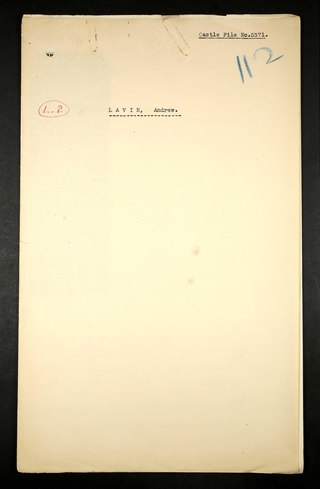Related Research Articles

The Leader of the Opposition in Ireland is a de facto term sometimes used to describe the politician who leads the largest party in the parliamentary opposition in Dáil Éireann, the house of representatives of the Oireachtas. In the Dáil, the leader of the opposition sits on the right-hand side of the Ceann Comhairle and directly opposite the Taoiseach. The role is not an official one and is not recognised in the Irish constitution, nor in legislation.

Francis Patrick Fahy was an Irish Fianna Fáil politician who served as Ceann Comhairle of Dáil Éireann from 1932 to 1951. He served as a Teachta Dála (TD) from 1919 to his death in 1953.

The 2007 Irish general election took place on Thursday, 24 May after the dissolution of the 29th Dáil by the President on 30 April, at the request of the Taoiseach. The general election took place in 43 parliamentary constituencies throughout Ireland for 166 seats in Dáil Éireann, the lower house of parliament, with a revision of constituencies since the last election under the Electoral (Amendment) Act 2005. The outgoing Fianna Fáil–Progressive Democrat administration was returned, joined by the Green Party and supported by some independents, giving a government majority of 9.
Samuel Edward Holt was an Irish Fianna Fáil politician.
James Nicholas Dolan was an Irish politician and TD for County Leitrim constituencies from 1918 to 1937.

Donegal is a parliamentary constituency which has been represented in Dáil Éireann, the lower house of the Irish parliament or Oireachtas, since the 2016 general election. The constituency elects five deputies on the system of proportional representation by means of the single transferable vote (PR-STV).
Christopher Michael Byrne was an Irish politician whose career as a Teachta Dála (TD) and Senator came in two distinct periods, separated by a decade's gap and a change of party. He was also involved in the Gaelic Athletic Association (GAA).
Bryan Cusack was an Irish Sinn Féin politician and medical doctor.

Pádraic Ó Máille was an Irish politician. He was a founder member of Sinn Féin and of the Conradh na Gaeilge in Galway. He was a member of the Irish Volunteers from 1917 to 1921.

Thomas Kelly was an Irish Sinn Féin and later Fianna Fáil politician. He was a book and picture dealer before entering politics. He was a founder member of Sinn Féin and was elected to Dublin City Council in 1899. Kelly was arrested after the 1916 Easter Rising and sent to prison in England, and after becoming seriously ill, he was released back to Dublin.
James Devins was an Irish Sinn Féin politician. He was elected unopposed as a Sinn Féin Teachta Dála (TD) to the 2nd Dáil at the 1921 elections for the Sligo–Mayo East constituency. He opposed the Anglo-Irish Treaty and voted against it. He was re-elected as an anti-Treaty Sinn Féin TD to the 3rd Dáil at the 1922 general election. His death in September 1922 "at the hands of former comrades", would indicate that he was a casualty of the Irish Civil War. He was executed without trial with five other comrades who had all surrendered to the Free State troops.

Andrew Lavin was an Irish politician and farmer. He was elected unopposed as a Sinn Féin Teachta Dála (TD) to the 2nd Dáil at the 1921 elections for the Leitrim–Roscommon North constituency. He supported the Anglo-Irish Treaty and voted in favour of it.
Daniel O'Rourke was an Irish politician and sportsman.
Thomas O'Donnell was an Irish politician. He was elected unopposed as a Sinn Féin Teachta Dála (TD) to the 2nd Dáil at the 1921 elections for the Sligo–Mayo East constituency. He supported the Anglo-Irish Treaty and voted in favour of it. He was re-elected as a pro-Treaty Sinn Féin TD at the 1922 general election. At the 1923 general election, he stood as a Cumann na nGaedheal candidate for the Leitrim–Sligo constituency but he was not elected.
Patrick MacCarvill was an Irish politician and medical doctor. He was born in Raw, County Monaghan, the son of farmers John McCarvill and Susan Moyna.
James Joseph Killane was an Irish politician. He was first elected to Dáil Éireann as a Sinn Féin Teachta Dála (TD) for the Longford–Westmeath constituency at the 1923 general election.
Martin Bernard McGowan was an Irish politician and teacher.

Thomas Pringle is an Irish independent politician who has been a Teachta Dála (TD) for the Donegal constituency since the 2016 general election, and previously from 2011 to 2016 for the Donegal South-West constituency.

The 2020 Irish general election took place on Saturday 8 February, to elect the 33rd Dáil, the lower house of Ireland's parliament. The election was called following the dissolution of the 32nd Dáil by the president, at the request of the Taoiseach, Leo Varadkar, on 14 January 2020. The members, Teachtaí Dála (TDs), were elected by single transferable vote in multi-seat constituencies. It was the first election since 1918 to be held on a weekend. Following the election, Fine Gael and Fianna Fáil entered into a historic coalition government.

The 2024 Irish general election to elect the 34th Dáil is due to be held on Friday, 29 November 2024, following the dissolution of the 33rd Dáil on 8 November by President Michael D. Higgins at the request of Taoiseach Simon Harris. It will elect 174 Teachtaí Dála (TDs) across 43 constituencies of between 3 and 5 seats to Dáil Éireann, the lower house of the Oireachtas, Ireland's legislature. Under the Electoral (Amendment) Act 2023, the number of TDs was increased from 160, with an increase in the number of constituencies from 39 to 43. This will be the largest Dáil in the history of the state.
References
- ↑ "Thomas Carter". Oireachtas Members Database. Archived from the original on 7 November 2018. Retrieved 15 December 2008.
- ↑ "Thomas Carter". ElectionsIreland.org. Archived from the original on 18 September 2007. Retrieved 15 December 2008.